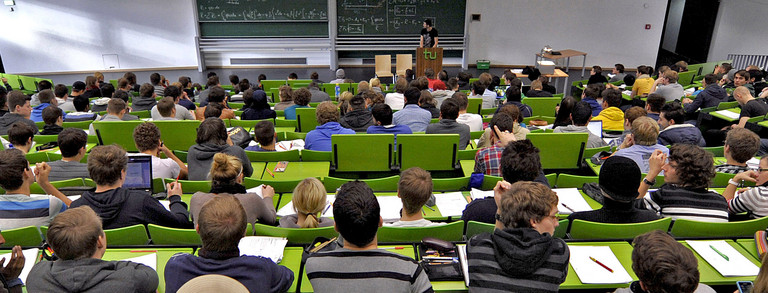Three questions to Professor Insa Melle on the possibilities of online teaching
- Service
- Top News
- Studying & Teaching at TU Dortmund University

In view of the current coronavirus crisis, for the moment courses will be offered exclusively online when the lecture period begins on 20 April. Whether, when and how attendance courses can be offered in the course of the summer semester is not yet foreseeable. That’s why a working group at TU Dortmund University led by Professor Insa Melle, Vice President Academic Affairs, is working at full speed to expand existing offers as far as possible. In this interview, she reports on the options already available and what further digital teaching and learning tools are currently in the planning.
Professor Melle, what possibilities for online teaching and learning are already in place at TU Dortmund University?
Many lecturers at TU Dortmund University have already been using online teaching and learning platforms for years and lots of students are already familiar with them. Especially Moodle offers a wide variety of possibilities and can also be used from home without a VPN connection. Here, lecturers can set up virtual classrooms for a specific group of students and upload documents there such as lecture notes or video and audio files of recorded lectures, for example. But interactive formats such as webinars, forums, peer reviews, group work and surveys are also possible with Moodle and other digital tools. To use this service, you simply need a normal computer, a notebook or a smartphone. For lecturers we recommend the free OBS Studio software for recording videos and the free Audacity software for audio recordings.
What other tools are already in the planning?
We want to expand the possibilities to broadcast courses live and make them interactive. To do so, we’re currently upgrading our possibilities for web conferencing, event streaming and webinars by a massive degree and will make first tools available at the beginning of April. A streaming server has been in operation at the IT and Media Center (ITMC) since last autumn, via which it’s possible to stream audios and videos for up to 1,000 participants at the same time. In addition, we’ve asked all faculties to tell us their individual requirements so that we can provide the necessary software and, if required, hardware too as quickly as possible.
Where do the challenges lie right now and where might there be opportunities?
Digital formats are definitely not possible in all areas, for example, lab work or certain artistic or creative activities. We’re currently working very hard on expanding our IT infrastructure capacities and testing and introducing new tools. The individual faculties’ experience to date in the use of digital formats varies considerably. Right now, we’re collecting best practice examples so that especially newcomers to digital teaching can see what’s possible. The ITMC has also already put together information about how to get started with digital teaching that is being constantly expanded. I believe that the current situation can also be an opportunity in the long term to try out and gradually optimize new teaching formats and use them permanently to supplement face-to-face teaching.
Further information:
Moodle course Short-term Transition to Online Teaching
About Insa Melle:
Insa Melle has been Professor for Chemistry and Didactics of Chemistry at TU Dortmund University since 1999. In 2012 she was elected as Vice Dean and in 2014 as Dean of the Faculty of Chemistry and Chemical Biology. On 1 September 2016 she took office as Vice President Academic Affairs. Her responsibilities in this role include all cross-faculty matters concerning studies and teaching.




![[Translate to English:] Partner Four hands are holding the green logo of TU Dortmund University](/storages/tu_website/_processed_/1/d/csm_Partner_Nicole_Rechmann_KW_40b35bb3fd.jpg)




![[Translate to English:] Forschung An apparatus with tubes in a laboratory](/storages/tu_website/_processed_/0/c/csm_Forschung_Juergen_Huhn_cbd34afd6d.jpg)
![[Translate to English:] Studium Five students are sitting in a lecture hall. They are talking to each other.](/storages/tu_website/_processed_/c/9/csm_Studium_FelixSchmale_81d94adc86.jpg)





